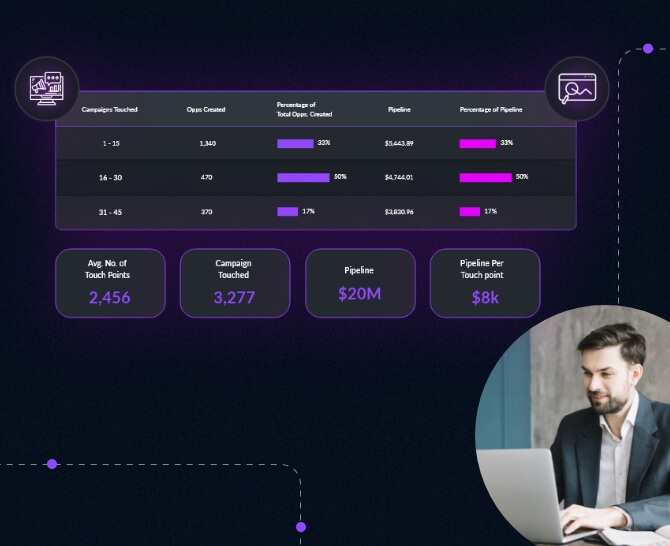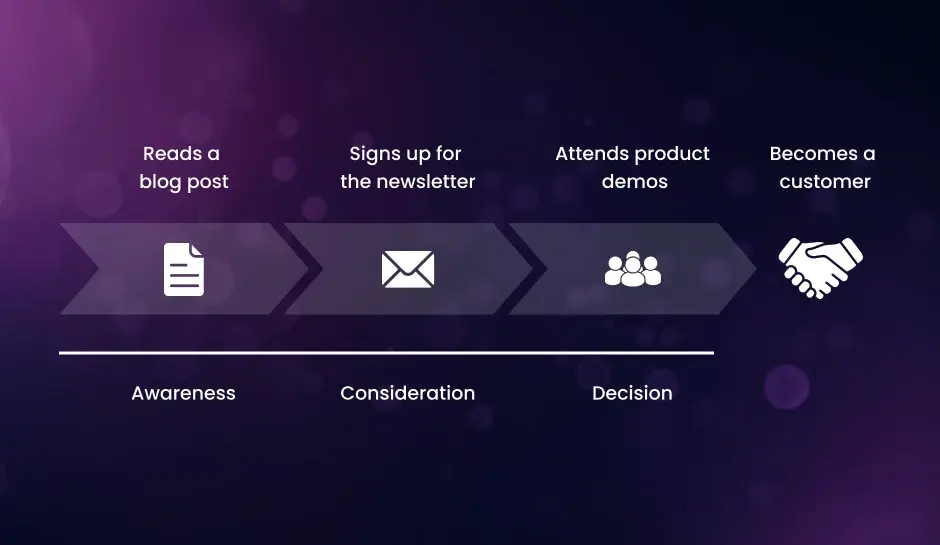
Boost the Effectiveness of Your Marketing Campaigns With Digital Marketing Analytics
Digital marketing analytics helps businesses collect, measure, and analyze data from various sources to gain insights into customer behavior & campaign performance. In this blog post, we have covered the importance of digital marketing analytics and how businesses can use it to boost the effectiveness of their marketing campaigns.
In today’s digital age, businesses face fierce competition and must constantly find new ways to engage with their target audience and drive revenue. Traditional marketing methods may no longer be enough to achieve success in a crowded digital marketplace.
This is where digital marketing comes in, providing businesses with valuable insights and data to make informed decisions about their marketing campaigns.
One of the key components of digital marketing is analytics. Digital marketing analytics involves collecting, measuring, and analyzing data from various sources to gain insights into customer behavior, campaign performance, and other key metrics.
In this blog post, we’ll explore the importance of digital marketing analytics and how businesses can use it to boost the effectiveness of their marketing campaigns.
Benefits of Using Digital Marketing Analytics
There are many benefits to using digital marketing analytics to improve your marketing campaigns. Here are some of its key advantages:
- Improved Decision-Making:
- Better Understanding of Customer Behavior:
- Increased ROI:
- Enhanced Customer Engagement and Retention:
By collecting and analyzing data about customer behavior, campaign performance, and other metrics, businesses can make more informed decisions about how to optimize their marketing campaigns for maximum effectiveness.
Digital marketing analytics can provide businesses with valuable insights into how their customers are interacting with their brand, such as which channels they are using, what content they are engaging with, and what actions they are taking.
By optimizing their marketing campaigns based on data-driven insights, businesses can increase their ROI and get more value out of their marketing spend.
By tailoring their marketing messages and tactics based on customer behavior data, businesses can improve their customer engagement and retention, ultimately leading to increased revenue and profitability.
Key Components of Digital Marketing Analytics
The focal point of digital marketing analytics is data that affects marketing strategy so that you can attract, engage, and retain your customers better. It involves several key components, including:
- Data Collection Tools and Techniques:
- Key Metrics to Track and Measure:
- Data Visualization Tools and Techniques:
Businesses must use a variety of tools and techniques to collect data from various sources, such as social media, email campaigns, website traffic, and more.
There are many different metrics that businesses can track and measure to gain insights into campaign performance and customer behavior. Some examples include click-through rates, conversion rates, bounce rates, and time on page.
To make sense of the data they collect, businesses need to use data visualization tools and techniques to create clear and meaningful reports and dashboards.
Understanding Your Audience
One of the key benefits of digital marketing analytics is that it provides businesses with valuable insights into their target audience. By analyzing customer behavior data, businesses can gain a better understanding of their audience demographics, behavior, and preferences.
For example, businesses can use digital marketing analytics to determine which channels their audience is using most frequently, what content they are engaging with, and what actions they are taking on their website. This information can help businesses tailor their marketing messages and tactics to increase engagement and drive more revenue.
By understanding their audience better, businesses can also identify new opportunities to reach and engage with them. For example, if a business notices that a significant portion of their audience is using a particular social media platform that they are not currently using, they can start investing resources in that platform to reach more customers.
Measuring ROI
In today’s business world, measuring the return on investment (ROI) is crucial to the success of any marketing campaign. This is where digital marketing analytics can be a game-changer for businesses.
By tracking key metrics like traffic, conversions, and revenue, businesses can make data-driven decisions about how to optimize their marketing campaigns for maximum ROI.
One of the benefits of using digital marketing analytics to measure ROI is that businesses can get a clear picture of how each marketing channel is contributing to their overall revenue. This can help them make informed decisions about which channels to invest more resources into and which ones to cut back on.
It also enables businesses to adjust their marketing budgets based on actual results, rather than relying on guesswork.
Optimizing Your Campaigns
Digital marketing analytics can provide businesses with valuable insights into which channels, messages, and tactics are driving the most engagement and revenue. By analyzing this data, businesses can identify areas where they can make improvements to their campaigns.
For example, if a business notices that their email campaigns are not driving as much revenue as their social media campaigns, they can adjust their email campaigns to be more effective.
This could involve changing the subject line, the content of the email, or the timing of the send. By continuously testing and refining their campaigns, businesses can improve their effectiveness over time.
Identifying Opportunities
Digital marketing analytics can also help businesses identify new opportunities to reach and engage with their target audience. By analyzing customer behavior data, businesses can discover new channels and tactics to reach their audience that they may not have considered before.
For example, if a business notices that a significant percentage of their audience is spending time on a particular social media platform that they are not currently using, they could start investing resources in that platform to reach more customers.
By constantly exploring new opportunities and experimenting with new channels and tactics, businesses can stay ahead of the competition and continue to drive revenue.
Role of Digital Marketers in Analytics
Digital marketers play a crucial role in the field of analytics, as they are responsible for implementing and leveraging marketing analytics to drive business success.
- Importance of digital marketers in implementing and leveraging marketing analytics:
- Skills and knowledge required for digital marketers to excel in analytics
- Collaboration between digital marketers and data analysts for effective analytics
Digital marketers are experts in identifying key performance indicators (KPIs) and tracking them using analytics tools. They analyze data to gain insight into customer behavior, preferences, and trends.
They use analytics to measure the effectiveness of marketing campaigns and strategies. By analyzing data, digital marketers can optimize their efforts and allocate resources to initiatives that generate the most ROI.
Through analytics, digital marketers can identify new opportunities and optimize customer journeys. They can make data-driven decisions to improve user experience, personalize marketing messages, and target the right audience.
Proficiency in data analysis tools and techniques, such as Google Analytics, Adobe Analytics, and social media analytics platforms.
Understanding of statistical concepts and methodologies, as well as the ability to interpret data and draw meaningful conclusions.
Knowledge of digital marketing channels and strategies, as analytics is integral to measuring the success and impact of various marketing initiatives.
Strong communication skills to effectively share insights and collaborate with data analysts, stakeholders, and other teams.
Digital marketers and data analysts often work hand in hand to extract actionable insights from data. While digital marketers provide context and domain knowledge, data analysts use their statistical expertise to analyze and interpret the data. This collaboration ensures that analytics efforts are both data-driven and aligned with the marketing goals of the organization.
Marketing Automation and Analytics
Marketing automation has become an essential tool for digital marketers in today’s fast-paced and data-driven industry. By integrating marketing automation tools with analytics platforms, marketers can streamline their processes and gain deeper insights into their campaigns.
One of the key advantages of leveraging marketing automation is the ability to collect and analyze data more efficiently. With automation, marketers can automatically gather data from various sources, such as website traffic, email marketing, and social media, and consolidate it into a single analytics platform.
By using analytics insights, marketers can automate and optimize their marketing campaigns. By identifying patterns and trends in the data, marketers can create targeted and personalized content that resonates with their audience. They can also automate the delivery of this content to the right people at the right time, increasing the effectiveness of their campaigns.
Furthermore, marketing automation allows marketers to track and measure the success of their campaigns in real-time. By monitoring key performance indicators (KPIs) such as click-through rates, conversion rates, and return on investment (ROI), marketers can make data-driven decisions and adjust their strategies accordingly.
Predictive Analytics in Digital Marketing
Introduction to predictive analytics and its application in digital marketing
Predictive analytics is a powerful tool that utilizes various statistical techniques and models to analyze historical data and predict future outcomes. In the realm of digital marketing, predictive analytics plays a crucial role in helping businesses make informed decisions and optimize their marketing strategies.
Predicting customer behavior, preferences, and future trends
By analyzing large amounts of data, predictive analytics can identify patterns and trends, allowing marketers to predict customer behavior and preferences. This valuable insight helps businesses tailor their marketing campaigns and personalize their messaging to target specific customer segments.
Additionally, predictive analytics can also forecast future trends in the market, enabling businesses to proactively adjust their strategies to stay ahead of the competition.
Utilizing predictive analytics to optimize marketing strategies
With the help of predictive analytics, digital marketers can optimize their marketing strategies by understanding which channels, campaigns, and messages are most likely to generate positive outcomes. By leveraging predictive models, businesses can allocate their resources more effectively, ensuring that their marketing efforts drive maximum results.
Moreover, predictive analytics can aid in lead scoring and customer segmentation, allowing businesses to identify their most valuable prospects and target them with tailored marketing initiatives.
Conclusion
Digital marketing analytics is an essential tool for businesses looking to boost the effectiveness of their marketing campaigns. By using digital marketing analytics to collect and analyze data, businesses can make informed decisions about how to optimize their campaigns for maximum ROI, improve customer engagement and retention, and identify new opportunities to reach and engage with their target audience.
Using digital marketing analytics can help you stay ahead of the competition and drive more revenue for your business. So, start using digital marketing analytics today and take your marketing campaigns to the next level!
Wish to Use Digital Marketing Analytics to Take Your Campaigns Up a Notch? Let’s Talk!
If you’re looking for a powerful tool to help you leverage the full potential of digital marketing analytics and drive better results for your business, check out DiGGrowth. With its AI-driven no-code marketing intelligence platform, DiGGrowth makes it easy to track and measure the ROI of your marketing activities, so you can make data-driven decisions that improve your campaigns and drive more revenue. Alternatively, feel free to write to us at info@diggrowth.com and we’ll get back to you.
Ready to get started?
Increase your marketing ROI by 30% with custom dashboards & reports that present a clear picture of marketing effectiveness
Start Free Trial
Experience Premium Marketing Analytics At Budget-Friendly Pricing.

Learn how you can accurately measure return on marketing investment.
Additional Resources
The Future of Marketing: How Predictive Lead and Account Scoring is Changing the Game
Can we, in this incredible marketing landscape driven...
Read full post postCloud Wars: A Comparative Analysis of Leading Cloud Vendors
How many companies are using cloud computing? Around...
Read full post postContent Marketing Attribution: Tracking Content Impact Across the Customer Journey
So, you've poured your heart into crafting the...
Read full post post Manreet Khara
Manreet Khara 

